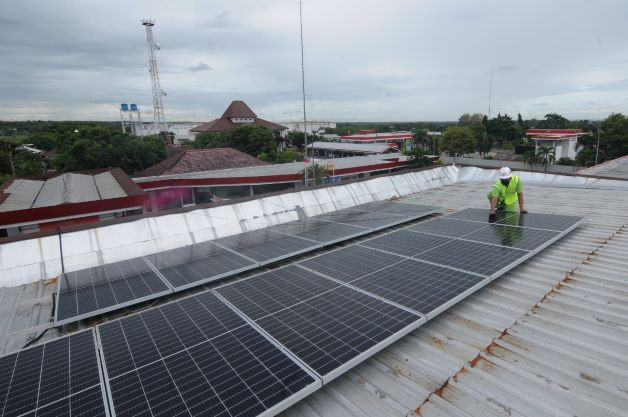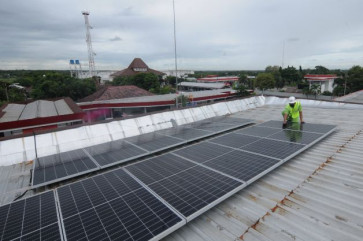Popular Reads
Top Results
Can't find what you're looking for?
View all search resultsPopular Reads
Top Results
Can't find what you're looking for?
View all search resultsUnearthing the catalyst for ASEAN’s energy transition in 2023
In addressing the intermittency while keeping the supply-demand stable, the member states should improve their grid flexibility and resiliency.
Change text size
Gift Premium Articles
to Anyone
 Saving energy: A worker cleans solar panels that generate electricity for a gas refueling station in Teras, the Central Java regency of Boyolali on Oct. 26, 2022. The renewable energy is said to help the gas station operator save 10-15 percent of its monthly electricity bill. (Antara/Aloysuis Jarot Nugroho)
Saving energy: A worker cleans solar panels that generate electricity for a gas refueling station in Teras, the Central Java regency of Boyolali on Oct. 26, 2022. The renewable energy is said to help the gas station operator save 10-15 percent of its monthly electricity bill. (Antara/Aloysuis Jarot Nugroho)
T
he year 2022 witnessed three summits hosted in Southeast Asia: The ASEAN Summit in Cambodia, the Group of 20 Summit in Indonesia and the Asia-Pacific Economic Cooperation (APEC) Summit in Thailand. They discussed economic recovery, climate action and sustainability, including accelerating the clean energy investment for energy security.
Energy security, which also took the centerpiece of 2022, is a core interest of ASEAN. With its economic growth and reliance on fossil fuels, the 7th ASEAN Energy Outlook (AEO7) estimated ASEAN would become the net importer of natural gas and coal as soon as 2025 and 2039, respectively, if no changes happen in demand and supply.
The ASEAN Summit reiterated the implementation of the ASEAN Plan of Action for Energy Cooperation (APAEC) Phase II: 2021-2025 through the deployment of cleaner energy technologies and end-user electrification. The G20 Summit launched the Just Energy Transition Partnership (JETP), a US$20 billion program dedicated to decarbonizing Indonesia’s power system. The APEC Summit adopted the Bangkok Goal for the Bio-Circular-Green (BCG) economy, a sustainable model to pursue advanced resource efficiency, less waste and value-creating business models.
Warmly welcomed by many, JETP aims for an investment and policy plan to deploy ambitious renewable energy (RE) share to at least 34 percent of Indonesia’s power generation mix by 2030 and to prioritize the early retirement of the coal-fired power plant. Following that, a similar commitment was made recently for Vietnam. Meanwhile, Bangkok’s BCG economy model promotes RE, biofuels and higher energy efficiency, which are all in line with the APAEC aspiration to have a 23 percent RE share of the total primary energy supply (TPES) by 2025.
According to the AEO7, ASEAN must fill the gap of almost 10 percent-point from the 14.2 percent RE share in 2020 to the 2025 regional target. Many member states’ key strategies are utilizing solar and wind energy. In the past five years, Vietnam, Thailand and Malaysia have significantly increased solar share in their national installed capacity, reaching 16.6 gigawatt, 2.8 GW and 1.5 GW respectively.
With its roles in addressing energy security and climate issues, ASEAN consistently works toward green energy ambitions through renewables. However, the main questions persist, what would be the sensible pace and priority to achieve their target after the summit? What are the best strategies to solve the rising energy security problems amidst the mounting economic challenges due to geopolitical conflicts and pandemics?
As the region targets more RE, especially solar and wind, more stress will be put on the electricity grid. In addressing the intermittency while keeping the supply-demand stable, the member states should improve their grid flexibility and resiliency. Missing that and we’ll see a “boom and bust” phenomenon.

















